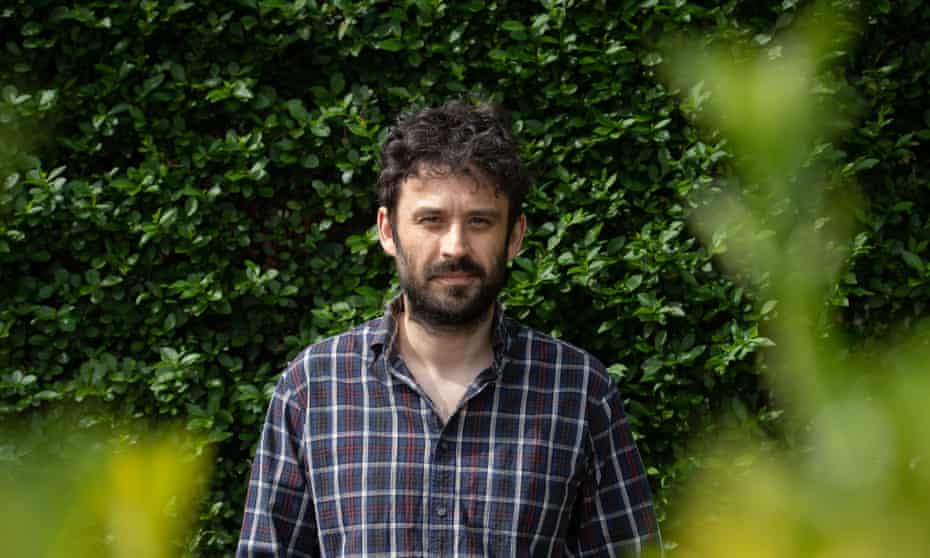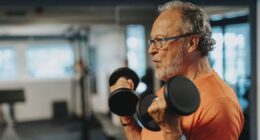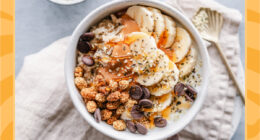‘My life was ruled by panic attacks’

Author Tim Clare spend a year learning how to tackle the problem. This is his seven-point guide to what worked for him
I’m pinned to the floor, screaming. From two rooms away comes the sound of nursery rhymes, playing at full volume – my wife’s attempt to drown me out, so I don’t frighten our baby daughter. I’m having a panic attack. I am terrified and, beneath the fear, burning with shame.
A couple of years ago, this was my reality. For more than a decade, panic attacks had controlled my life. I had several every week. I was continually, grindingly anxious.
I kept telling myself it wasn’t that bad, that each attack was a freak occurrence – I’d been tired or under pressure. Becoming a dad changed all that. I’d read the grim statistics linking parental mental illness to lower academic achievement and resilience in children – one study even found it correlated with a heightened risk of asthma. I couldn’t let it go on.
I embarked on a year of trying everything I could, seeking out every treatment, every new frontier in research, to beat my anxiety. What followed was a long, uncomfortable process of unlearning. I thought I’d feel smarter, more in control. Instead, with each study I read, each researcher I spoke with, I felt less sure of my expertise. This was not the journey I had planned. I wanted Twelve Rules, Seven Habits, One Weird Trick.
But the darnedest thing is: it worked.
I’m going to share some things I tried, all based on robust, replicated research. Still, I am but one guinea pig: my experiences and results may not apply universally.
If you want to tackle your anxiety, be a good scientist. Try things. Observe the results. Anxious people crave certainty. Science is about doubt. What I learned through my experiments was, once you embrace uncertainty, you make space for possibility. That’s where change happens.
Find the exercise that works for you
Anxiety sufferers are often told exercise is a miracle pill, yet research into the anxiety-relieving effects of exercise has yielded mixed results. When I started exercising, I hated it. Soon I found I enjoyed two types most: HIIT (High Intensity Interval Training) and LISS (Low Intensity Steady State). The former is doing things like sprints and star jumps for 30-45 seconds with short rests. The latter is like jogging, walking and swimming.
HIIT was a great way for me to practise facing the symptoms I used to experience during a panic attack: breathlessness, a tight chest and a pounding heart. It’s like exposure therapy. LISS improved my overall health, and last year I ran my first marathon. I can still worry during a run, but it often improves my mood, especially my sense of what psychologist Albert Bandura called ‘self-efficacy’: my belief I can cope with challenges.
Pay attention to your diet
Many articles get published in which writers make awed noises about the gut being our “second brain”, and the power of our gut microbiome to improve our mental health. Much of this, microbiologist Simon Carding told me, is hype – marketing by probiotic drink makers and journalists misreading the results of studies in mice.
Certainly, our gut and our brain are in constant communication via the vagus nerve and the enteric nervous system, but the idea we can beat anxiety with kimchi, sauerkraut or other fermented foods is not supported by strong evidence.
Anxiety is associated with crashes in blood sugar. Stress triggers the release of glucose into the blood – to give us energy to run or fight – which triggers insulin to reabsorb it when it isn’t used up. So anxiety causes brief hyperglycaemic highs followed by lows where you feel dizzy and tired and you can’t think straight.
Sugary foods and refined carbs trigger the same cycle, so quitting energy drinks and junk food was good for me. I lost 3st over several months. There’s emerging evidence of a link between anxiety and chronic inflammation, and reducing excess body fat is one way to reduce inflammation. Some studies have suggested eating a Mediterranean diet – lots of fresh fruits and vegetables rich in plant-based polysaccharides, nuts, olive oil and not much meat – has a mild correlation with lower anxiety.
These changes are nudges rather than cures, but they also happen to be good for your health across a range of profiles. It was certainly good for my self-esteem, energy levels and overall mood to switch from cheesy kebabs to a rainbow of fresh vegetables. These days, I feel much less jittery without the constant sugar crashes.
READ RELATED: Experience: I punctured my lung by eating cereal
Don’t rely solely on medication
Taking medication for anxiety is still a highly charged topic. I suspect part of the reason is the radically different experiences many people have. For some, it’s like flicking a light switch. The first time I took the SSRI sertraline, I woke up the next morning and I simply was not anxious. The effects didn’t last, but for that brief honeymoon period I was just cured.
On the other hand, I’ve experienced many side-effects from meds – including anorgasmia, twitching, sweats and diarrhoea – and sometimes they’ve done nothing at all. Given the huge variation in individual response, it’s often hard for those on different sides of the debate to believe opposing arguments could ever be made in good faith.
Meta-analyses of hundreds of trials show SSRIs and SNRIs consistently perform better, on average, than placebos when it comes to reducing symptoms of disordered anxiety. But maybe 60-70% of people who take them without other interventions do not see a remission of symptoms. Those numbers are in line with many treatments in modern medicine, but they suggest, whether or not you choose to explore medication, you you should try other approaches in parallel.
Cold-water exposure can help
As an anxiety cure, jumping in a cold shower or swimming outdoors in cold weather sits somewhere between legitimate and alternative medicine. The crucial distinction is what claims you make for it.
In my experience, a quick dip in cold water outdoors leaves me glowing. It boosts my mood, quietens the chatter in my head, and it’s just quite funny. Look at me, a big, silly man, freezing in a river. It always makes me laugh, even if the laughs come between screams.
There’s some evidence to suggest controlled cold-water exposures help normalise the hormonal cascade our body releases under stress, as we adapt to the shock. All I can say is I’m a sucker for them. They’re initially horrible but I’ve never ever felt worse afterwards or regretted doing one.
The jury is still out on psychedelics
There’s been a lot of excitement around the use of psilocybin, LSD and MDMA to help ease end-of-life anxiety in terminally ill patients, and treatment-resistant depression. The trials leaves a lot to be desired – they lack credible placebo results, their samples suffer from selection bias, and they involve intensive therapy, so it’s not clear if psychedelics are a necessary component.
My experience of taking the high dose of psilocybin used in these trials was, admittedly, diverting – melting walls, jellyfish, an encounter with a translucent angel – but not obviously therapeutic. Even the best results of trials suggest the benefits – symptom remission seems to happen in around a third of cases – are temporary. As a spiritual experience, taking a trip under safe, controlled conditions may prove profound and valuable. As an anxiety treatment, I’m glad I tried it, but it didn’t make me better.
Writing can have unexpected benefits
Clearly, if writing were therapeutic, authors would be the happiest, calmest people on earth. It turns out that the type of writing matters. Gratitude journals are often pushed by the Positive Psychology movement as one of its most robustly evidenced interventions, but multiple meta-analyses have found their supposed benefits to be weak to non-existent. At best, they may have a small placebo effect on mood.
On the other hand, research into writing about traumatic experiences suggests it can boost subjective wellbeing, health, immune response and even the healing rate of a 3mm punch biopsy wound. Crucially, psychologist James W Pennebaker told me, you have to connect details about the event with your feelings then and now. Ironically, in the process of writing down my experiences for the book, I may have blundered into a powerful, free means of engaging with our challenging memories and emotions.
Talk honestly about how you feel
Author and anxiety therapist Mike Shel put it to me this way: “Until a person feels understood, all the information in the world, all the data, all the scientific understanding of the process and coping strategies are for naught. A person needs to feel that someone gets what they are struggling with.”
Anxiety is, at its core, a message. It’s an ancient signal that the organism – you – is in danger. Often that signal is wrong – there is no monster under the bed, the coiled snake is just a rope – , but it longs, craves to be heard. There is something profoundly healing in being understood – in feeling that whatever you’ve been through, the emotions you carry, the reality of your fight, someone sees it, someone sees you, and they get it. Finally, the message has been delivered. Finally, you can rest.
For me, the combination of eating well, regular, challenging exercise, cold-water swimming and small interventions like noting down my tasks for the week so I don’t have to carry them in my head (thus reducing my cognitive burden) made a significant difference. At the time of writing I’ve gone two and a half years without a panic attack. Most important was writing and talking honestly about my experiences of anxiety, and my deep shame. Words like vulnerability and connection have been hammered into such bland shapes on the pop-psych anvil that it’s hard to recognise their original, wonky beauty, but when we can be ourselves in front of others, and they accept us, recovery is almost inevitable.
Coward: Why We Get Anxious and What We Can Do About It by Tim Clare is published by Canongate (£16.99). Buy it for £14.78 at guardianbookshop.com
Source: Health & wellbeing | The Guardian





